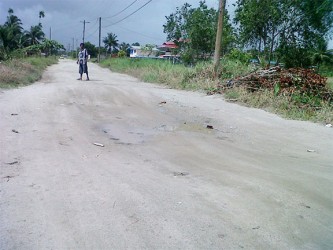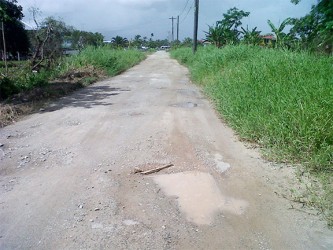Story and photos by Roger Wong
Although there has been significant transformation in most of the small villages along the East Bank Essequibo, some residents have been complaining about the unacceptable condition of the road which has been adversely affecting them.
Growing up in villages like St Lawrence and Present Hope for those who are approaching their thirties meant growing up with no electricity, road, telephone or even a gas stove.
Many of the houses were small wooden buildings, some with thatched roofs, wooden windows and doors. From around 5 o’clock in the morning, one would see swirls of smoke emitting from the small attachments to the houses, which were used as kitchens and referred to as the ‘cow mouth.’ This meant the women were already up making breakfast and lunch on the fireside made of daubed clay. The men would be sharpening their cutlasses, preparing to go to their farms, either by foot or paddling the calm black waters. That was then.

Today, the area is adorned with modern concrete buildings, many of them two storeys with iron grill gates and fences, paved parapets and furnished with modern amenities.

Although farming is still popular, many of the young men choose to work with the sawmills close by or operate taxis while young women work as teachers or seek employment at businesses in Parika.
Villagers, while comfortable, complain that the road they are forced to traverse daily has not kept pace with other developments.
Wendell De Camp of Present Hope is a businessman. He has been driving around the area for the past seven years with in a minibus filled with clothing, cosmetics among many other things which he sells. He is dissatisfied with the condition of the road.
“It had a meeting here with [former local government minister] Ganga Persaud and the same concerns I raised in the meeting is what I am telling you… [Persaud] said they were considering filling them, but my concern is that when they full the holes they get back bad again,” said De Camp. He explained that over the years the road had been constantly repaired only to deteriorate soon afterwards. Persaud resigned as local government minister over a year ago.
The businessman opined that the establishment of a new road, built skilfully with the right materials might be the best option, since the foundation of the road is poor. This was what caused its consistent deterioration over the years.
“Right now my vehicles need repairs because of the holes which damaging the vehicles… Added to that is the weight which I carry on the bad road and it got plenty farmers and sawmillers who use the road very often,” said De Camp as he further

highlighted the importance of the road, since it is the only means of access to the community.

“They got people digging and filling up the holes and as soon as the rain fall, it get bad again… Is only last December they full up the holes and it done get bad and you na even see the work wa them do,” De Camp added.
A farmer, Sunil (only name given) said that he has been using the road to transport his produce to the market for the past 15 years with his Canter, but the condition of the road has cost him, since driving a laden Canter while manoeuvring the potholes resulted in him breaking his vehicle’s spring on occasions.
Also speaking to Stabroek News was Ratiebhaan Singh, a farmer of Lookabu, who also transports his produce to the market with a Canter. “The road is not as bad as it was before. We need an original road yes, but the minister had a meeting here… and he promised that sometime this year that the road go fix,” Singh said. He expressed that should the road be given frequent maintenance, the small holes will not become ponds.
“Is because the opposition giving them a rough time in Parliament and cutting the budget that is why them na get enough money to do the road. If PPP get back in office this time, from Parika to Maripa go do,” Singh opined.
Singh’s wife Indranie said their lives are comfortable but the recent upsurge in rum shops in the area had been attracting many of the young people who are still in school. She lamented that some children could be seen congregating at the shops, which remain open very late at night, playing loud music, disturbing those children who are preparing for exams and preventing residents from hearing the news on their televisions at night

and from sleeping.
While Indranie expressed hope for a new road she along with her husband noted that there was a marked absence of any police patrol in the area.

Trevor Kingston, 40, a labourer of Bendorff, also believes that the road’s condition is unacceptable. “As you could see, it terrible! Especially when the rain fall; you children can’t walk to school. Dem whole uniform get sheer mud,” Kingston told Stabroek News. He added that the holes becomes ponds whenever it rains in his village, forcing the residents to create outlets to drain the water from the road. “If you don’t dig the drain, you gon ga swim fu pass the pond.”
A housewife, Nazeema Persaud of Naamless, related that whenever it rains it makes it difficult for motorists to reach her village and school children are left to battle the muddy road to school.





